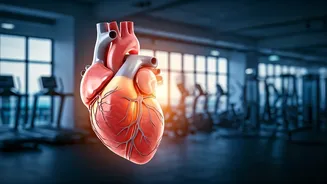Dietary Pitfalls Unveiled
While exercise is beneficial, poor dietary choices can sabotage your heart health. A diet abundant in processed foods, trans fats, and excess sugar may
undo the positive effects of your workouts. These foods can cause your arteries to clog over time, leading to cardiovascular problems. So, what you consume is as significant as how often you move. Be mindful of what you're eating! Think about replacing those unhealthy snacks with fruits and vegetables. These foods can help you maintain heart health.
Overtraining: A Setback
Pushing your body beyond its limits without sufficient rest can be detrimental to your heart. When you constantly overtrain, your body releases elevated levels of stress hormones, like cortisol. This increase can trigger inflammation throughout the body and strain your heart. It is critical to balance your workout schedule with adequate rest days to allow your body to recover and repair itself. Remember, rest is not laziness; it's a vital part of your fitness journey and heart health.
Endurance Training Risks
While endurance training like marathon running offers numerous benefits, it's essential to understand its potential drawbacks. Long-term, intense endurance workouts can induce structural changes within the heart. These alterations may elevate your risk of developing atrial fibrillation, a condition characterized by an irregular heartbeat. It's crucial to balance endurance activities with other forms of exercise and proper rest to mitigate these risks. If you are experiencing chest pain or other discomfort, it is better to consult a professional.
Hidden Genetic Factors
Sometimes, your genes may be playing a role in your heart health. Conditions such as hypertension (high blood pressure) and elevated cholesterol levels or a genetic predisposition can silently affect your heart. These issues may remain unnoticed, even if you are in good shape. Regular health check-ups and screenings are vital to identify and address such underlying factors early on. If heart disease runs in your family, this is particularly important, as you may be at higher risk.
Recovery & Sleep Needs
Your heart requires adequate time to repair itself, and that is where sleep and recovery come in. Consistently neglecting sufficient sleep or skipping recovery days can weaken your heart, leaving it more vulnerable. This increases your chances of experiencing arrhythmias (irregular heartbeats) and feeling fatigue. Make sleep a priority and integrate rest days into your workout routine. This approach allows your body to rejuvenate and strengthens your cardiovascular system for the long haul. Remember, sleep and rest are not luxuries; they are necessities for optimal heart health.
Warning Signs to Heed
Pay close attention to any unusual symptoms during your workouts. Experiencing chest tightness, shortness of breath, or dizziness during exercise is a sign of an underlying cardiac issue. Never ignore these warning signals. If you experience these symptoms, seek medical advice promptly. These can signal an issue that needs immediate attention. Ignoring these signs could have serious consequences for your heart health. Prioritizing your well-being includes listening to your body.















